An award-winning Arizona newspaper publisher and his wife are locked in a bizarre divorce case that has morphed into something more: a journalism ethics saga.
Joseph Soldwedel has accused wife Felice Soldwedel in a lawsuit of trying to kill him by poisoning him, and detailed the allegations in one of the small-town newspapers he owns, the 13,000-circulation Prescott Daily Courier.
Click to Gallery
An award-winning Arizona newspaper publisher and his wife are locked in a bizarre divorce case that has morphed into something more: a journalism ethics saga.
Soldwedel's wife of eight years calls the poisoning claims ludicrous and says he is retaliating against her for seeking a divorce.
"It's highly problematic for a publisher to be using the editorial resources of the paper to pursue a personal vendetta," said Edward Wasserman, dean of the graduate journalism school at the University of California, Berkeley. He added: "The whole thing is pretty bizarre because someone who is not the publisher would not get that kind of attention, absent law enforcement taking it seriously."
Soldwedel's father built Western News and Info Inc. by buying smaller newspapers across Arizona. Joseph Soldwedel, now 66, delivered newspapers as a boy and at 23 became publisher of a paper in the chain. He has run the chain that owns and partially owns 13 newspapers for more than three decades.
He is now seeking to annul the marriage and invalidate the agreement. The divorce case will be tried in February, and Joseph Soldwedel's attorney is expected to raise the poisoning allegations to try to nullify the prenuptial agreement, said John Mull, the lawyer representing Felice Soldwedel.
None of the three news stories in the paper named his wife. But the Courier ran an ad accusing her by name, with a photo of her, bordered with images of skulls and rats. The ad said she had an unnamed accomplice, and it offered a $10,000 reward for tips.

In this Nov. 20, 2018 photo, Joseph Soldwedel, the publisher of the Prescott Daily Courier, poses for a photo in Phoenix. Soldwedel, the owner of a chain of small Arizona newspapers, and his wife Felice are locked in a nasty divorce dispute that includes allegations of poisoning. (AP PhotoMatt York)
Soldwedel's wife of eight years calls the poisoning claims ludicrous and says he is retaliating against her for seeking a divorce.
"I've had people call me, text me, 'Felice, is that you in the paper? Oh my god,'" she told The Associated Press. "It almost makes you feel like you want to leave town. He made me look like this horrible person."
The lawsuit alleging poisoning seeks $18 million from Felice Soldwedel and was filed a week after a prosecutor said there was no evidence of a crime and declined to file charges.

In this Nov. 20, 2018 photo, Joseph Soldwedel, the publisher of the Prescott Daily Courier, poses for a photo in Phoenix. Soldwedel, the owner of a chain of small Arizona newspapers, and his wife Felice are locked in a nasty divorce dispute that includes allegations of poisoning. (AP PhotoMatt York)
"It's highly problematic for a publisher to be using the editorial resources of the paper to pursue a personal vendetta," said Edward Wasserman, dean of the graduate journalism school at the University of California, Berkeley. He added: "The whole thing is pretty bizarre because someone who is not the publisher would not get that kind of attention, absent law enforcement taking it seriously."
Soldwedel said the coverage was proper and he wanted to ensure law enforcement thoroughly investigates his claims. The Prescott paper did not run a story about the police investigation clearing his wife, he said, because "we don't think it's concluded."
"I'm hoping to get her into court and to get it into trial and bring up enough evidence to the surface that police could not ignore it," he told the AP.

In this Nov. 19, 2018, photo, Felice Soldwedel, wife of Joseph Soldwedel, poses for a photograph at her home in Prescott, Ariz. Joseph Soldwedel, the owner of a chain of small Arizona newspapers, and his wife Felice are locked in a bizarre divorce dispute that includes allegations of poisoning. (AP PhotoRoss D. Franklin)
Soldwedel's father built Western News and Info Inc. by buying smaller newspapers across Arizona. Joseph Soldwedel, now 66, delivered newspapers as a boy and at 23 became publisher of a paper in the chain. He has run the chain that owns and partially owns 13 newspapers for more than three decades.
In 2001, he won an award from the Arizona Newspaper Association after launching a newspaper to investigate southern Arizona law enforcement and government agencies. He did so after he said police entered his home on what he claimed were false pretenses.
Felice Magana joined Western News in 1999 and worked as an advertising sales executive. They married in 2010; it was the third marriage for both of them. They signed a prenuptial agreement guaranteeing she would receive $900,000 if they divorced and $1 million if Joseph Soldwedel died.
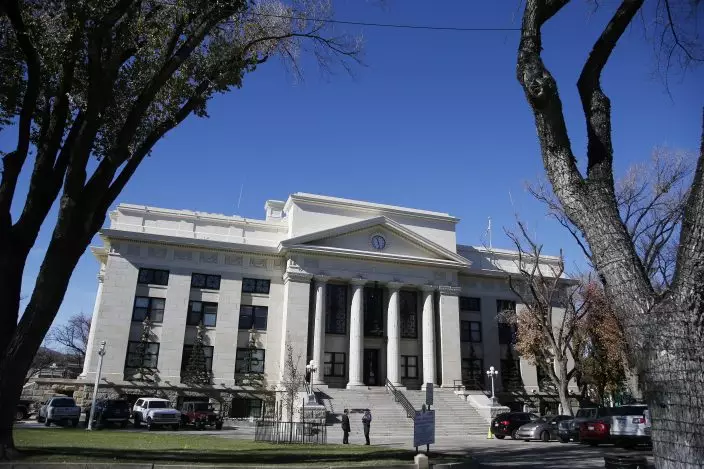
This Nov. 19, 2018, photo shows the Yavapai County Court House in Prescott, Ariz., where Joseph Soldwedel, the owner of a chain of small Arizona newspapers, and his wife are locked in a nasty divorce case that includes allegations of poisoning. Prosecutors have cleared Felice Soldwedel of any wrongdoing in the alleged scheme, but that hasn't stopped Joseph Soldwedel from pursuing his claims in civil court and chronicling them in his company's newspaper. (AP PhotoRoss D. Franklin)
He is now seeking to annul the marriage and invalidate the agreement. The divorce case will be tried in February, and Joseph Soldwedel's attorney is expected to raise the poisoning allegations to try to nullify the prenuptial agreement, said John Mull, the lawyer representing Felice Soldwedel.
In 2016, Soldwedel said he had shortness of breath, headaches and fever that he first attributed to the flu. But he began to suspect he had been poisoned and sent hair and nail samples to a Colorado laboratory to test. The lab's general manager, Kaily Bissani, told the AP that thallium — a heavy metal once used in rat poison — was found at levels six to 15 times higher than normal.
A toxicologist Soldwedel hired to interpret the results said there was a "strong probability" he was intentionally poisoned because Soldwedel didn't have any environmental exposure to thallium.

This Nov. 19, 2018, photo shows an entrance of the Prescott Daily Courier, owned by Joseph Soldwedel, in Prescott, Ariz. Soldwedel and his wife Felice Soldwedel are locked in a bizarre divorce dispute that includes allegations of poisoning. (AP PhotoRoss D. Franklin)
Soldwedel said he believes his wife slipped poison into his food, and his attorney requested police investigate in September 2017. Prescott police searched Felice Soldwedel's computer and cellphone records and found nothing to indicate she poisoned him.
In October 2017, police collected their own samples of his hair and found no signs of thallium or illicit drugs. But by then, Soldwedel said, he had cut his hair and undergone therapy to rid his body of heavy metals. He said he has mostly recovered.
Police decided to test for illicit drugs a hair sample that Soldwedel had sent to the Colorado lab, and it came back positive for methamphetamine. Soldwedel told the AP he suspects his wife dosed his shampoo and food with methamphetamine, another claim she denies. Police did not retest that sample for thallium.
Thallium is sometimes found as an impurity in illegal drugs, and prosecutors suggested thallium in the sample could be caused by methamphetamine use.
Around the time Felice Soldwedel filed for divorce in April 2017, she reported to police her husband was stalking or harassing her. Joseph Soldwedel pleaded guilty to aggravated harassment and criminal damage. He's on probation. The Prescott Daily Courier did not publish any stories about the case.
Felice Soldwedel, 63, first read about the poisoning allegations in a December 2017 issue of the newspaper left on her driveway, even though she wasn't a subscriber.
No one from the newspaper has sought her side of the story, she said.
Joseph Soldwedel said that he never instructed reporters at his papers not to contact her, but that doing so could put him at legal risk because he is under court order not to contact her.
"We're not going to test it," he said.
Reporting all sides of stories is a basic journalism rule, said Mi-Ai Parrish, a professor at Arizona State University's Walter Cronkite School of Journalism and former publisher of the Arizona Republic, the state's largest newspaper. "Having ethics and credibility in journalism is paramount, and you damage not only the reputation of yourself but of your publication," she said.
Joseph Soldwedel said he was careful not to name his estranged wife until her identity became public through his lawsuit. He said his staff urged him to hold off on the initial story for a few months to see how the police investigation played out.
"Everybody wasn't on board 100 percent but said, 'OK.' I do have ultimate authority," he said.
VENICE, Italy (AP) — Under the gaze of the world’s media, the fragile lagoon city of Venice launched a pilot program Thursday to charge day-trippers a 5-euro ($5.35) entry fee that authorities hope will discourage visitors from arriving on peak days and make the city more livable for its dwindling residents.
Visitors arriving at Venice's main train station were greeted with large signs listing the 29 dates through July of the plan's test phase that also designated separate entrances for tourists, and residents, students and workers.
“We need to find a new balance between the tourists and residents,’’ said Simone Venturini, the city’s top tourism official. “We need to safeguard the spaces of the residents, of course, and we need to discourage the arrival of day-trippers on some particular days.”
Not all residents, however, are persuaded of the efficacy of the new system in dissuading mass tourism, insisting that only a resurgence in the population will restore balance to a city where narrow alleyways and water buses are often clogged with tourists.
Hundreds of Venetians protested against the program, marching festively though the city's main bus terminal behind banners reading “No to Tickets, Yes to Services and Housing.” Protesters scuffled briefly with police with riot gear who blocked them from entering the city, before changing course and entering over another bridge escorted by plainclothes police officers. The demonstration wrapped up peacefully in a piazza.
Tourists arriving at the main station encountered almost as many journalists as stewards on hand to politely guide anyone unaware of the new requirements through the process of downloading the QR code to pay the fee.
Arianna Cecilia, a tourist from Rome visiting Venice for the first time, said she thought it was “strange” to have to pay to enter a city in her native country, and be funneled through separate entrance ways for tourists. She and her boyfriend were staying in nearby Treviso, and so downloaded the QR code as required. But she was still caught off-guard while soaking in her first view ever of Venice's canals by the sight of the entrance signs and her boyfriend telling her to get out the ticket.
On the other side of the entrance ways, workers in yellow vests carried out random checks at the train station. Transgressors face fines of 50 to 300 euros ($53 to $320), but officials said “common sense” was being applied for the launch.
The requirement applies only for people arriving between 8:30 a.m. and 4 p.m. Outside of those hours, access is free and unchecked.
Venice has long suffered under the pressure of overtourism, and officials hope that the pilot project can help provide more exact figures to better manage the phenomenon.
The city can track the number of hotel visitors, which last year numbered 4.6 million and is down 16% from pre-pandemic highs. But the number of day visitors, which make up the majority of the crowds in Venice, could only be estimated until recently.
A Smart Control Room set up during the pandemic has been tracking arrivals from cellphone data, roughly confirming pre-pandemic estimates of 25 million to 30 million arrivals a year, said Michele Zuin, the city’s top economic official. That includes both day-trippers and overnight guests.
But Zuin said the data is incomplete.
“It’s clear we will get more reliable data from the contribution” being paid by day-trippers, he said.
Venturini said the city is strained when the number of day-trippers reaches 30,000 to 40,000. On peak days, local police set up one-way traffic for pedestrians to keep the crowds moving.
Residents opposing the day-tripper tax insist that the solution to Venice's woes are to boost the resident population and the services they need, limiting short-term rentals to make available more housing and attract families back from the mainland.
Last year, Venice passed a telling milestone when the number of tourist beds exceeded for the first time the number of official residents, which is now below 50,000 in the historic center with its picturesque canals.
“Putting a ticket to enter a city will not decrease not even by one single unit the number of visitors that are coming,’’ said Tommaso Cacciari, an activist who organized a protest Thursday against the measure.
“You pay a ticket to take the metro, to go to a museum, an amusement park. You don’t pay a ticket to enter a city. This is the last symbolic step of a project of an idea of this municipal administration to kick residents out of Venice,” he said.
Venice Mayor Luigi Brugnaro declared the launch day, coinciding with an Italian holiday, a success, registering 15,700 paying visitors, 50% more than anticipated.
More than 97,000 others had downloaded a QR code denoting an exemption, including to work in Venice or as a resident of the Veneto region. Hotels in Venice, including in mainland districts like Marghera or Mestre, provided a QR code for visitors to attest to their stay, which includes a hotel tax — accounting for 40,000 of those.
Venturini, the tourist official, said that interest in Venice’s pilot program has been keen from other places suffering from mass tourism, including other Italian art cities, and municipalities abroad such as Barcelona, Spain, and Amsterdam.
But Marina Rodino, who has lived in Venice for 30 years, doesn't see the fee as the cure-all. Neighboring apartments in her residential building near the famed Rialto Bridge once inhabited by families are now short-term apartment rentals.
The corner butcher shop closed. Yet she noted that the new entrance fee requirement will still allow young people to flood the city in the evening for the traditional aperitivo, which can grow rowdy.
She was passing out mock European Union passports for “Venice, Open City,” underlining the irony of the new system, and challenging its legal standing with citations from the Italian Constitution guaranteeing its citizens the right to “move or reside freely in any part of the national territory."
“This is not a natural oasis. This is not a museum. It is not Pompeii. It is a city, where we need to fight so the houses are inhabited by families, and stores reopen. That is what would counter this wild tourism,’’ Rodino said.
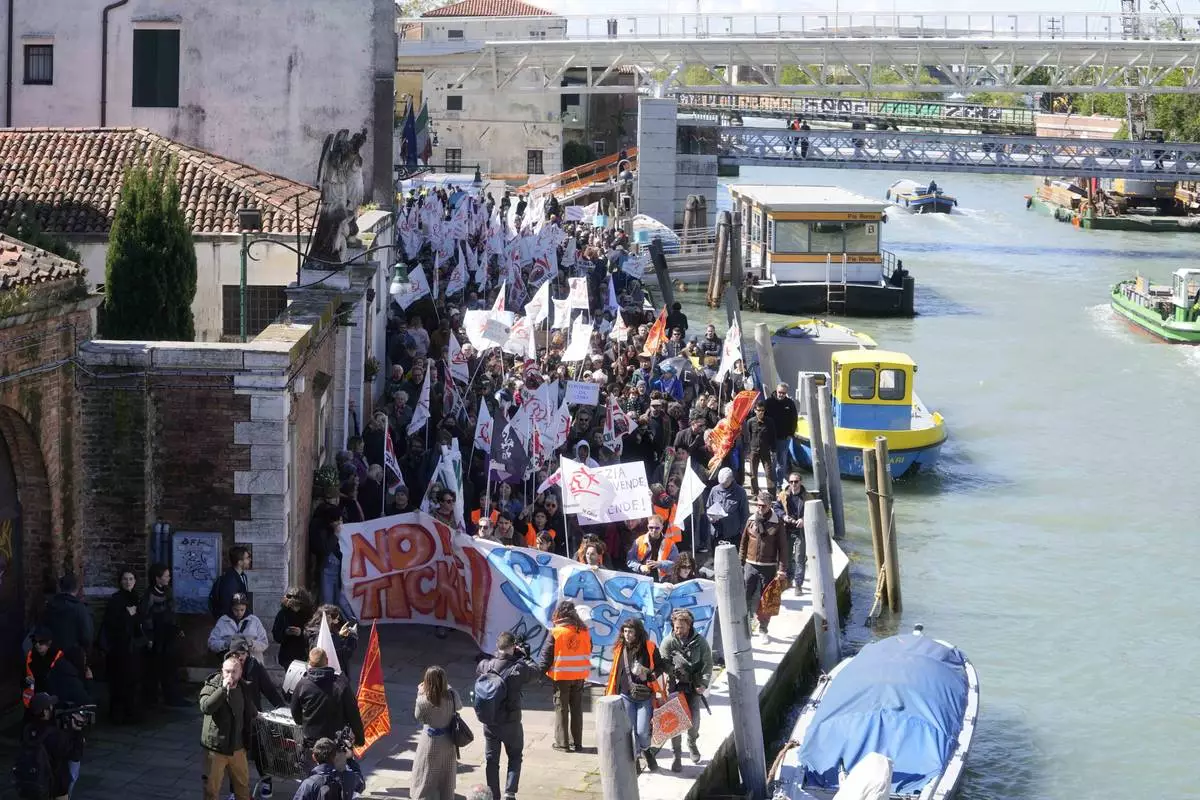
Citizens and activists stage a protest against Venice Tax Fee in Venice, Italy, Thursday, April 25, 2024. The fragile lagoon city of Venice begins a pilot program Thursday to charge daytrippers a 5 euro entry fee that authorities hope will discourage tourists from arriving on peak days. The daytripper tax is being tested on 29 days through July, mostly weekends and holidays starting with Italy's Liberation Day holiday Thursday. Officials expect some 10,000 people will pay the fee to access the city on the first day, downloading a QR code to prove their payment, while another 70,000 will receive exceptions, for example, because they work in Venice or live in the Veneto region. (AP Photo/Luca Bruno)

A citizen shows a ticket with the writing 'Veniceland' during a protest against Venice Tax Fee in Venice, Italy, Thursday, April 25, 2024. The fragile lagoon city of Venice begins a pilot program Thursday to charge daytrippers a 5 euro entry fee that authorities hope will discourage tourists from arriving on peak days. The daytripper tax is being tested on 29 days through July, mostly weekends and holidays starting with Italy's Liberation Day holiday Thursday. Officials expect some 10,000 people will pay the fee to access the city on the first day, downloading a QR code to prove their payment, while another 70,000 will receive exceptions, for example, because they work in Venice or live in the Veneto region. (AP Photo/Luca Bruno)
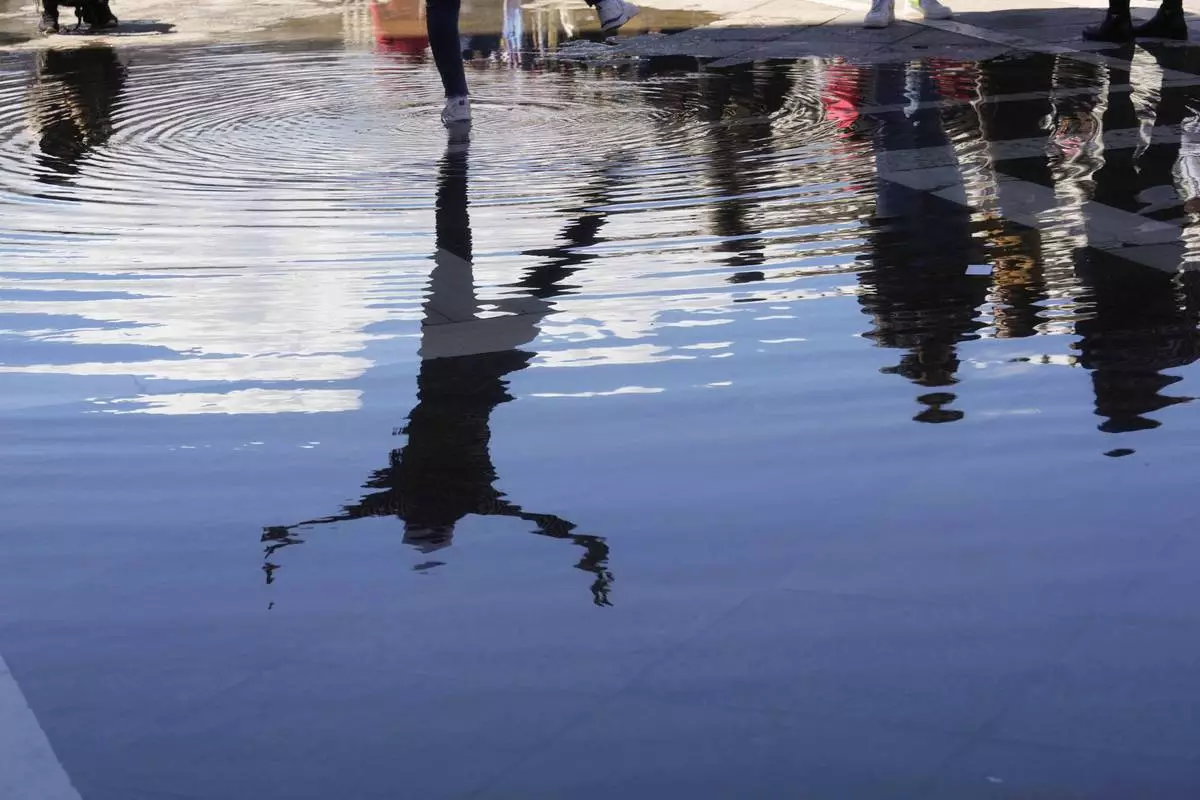
Tourists enjoy a sunny day at St.Mark square in Venice, Italy, Thursday, April 25, 2024. The fragile lagoon city of Venice begins a pilot program Thursday to charge daytrippers a 5 euro entry fee that authorities hope will discourage tourists from arriving on peak days. (AP Photo/Luca Bruno)
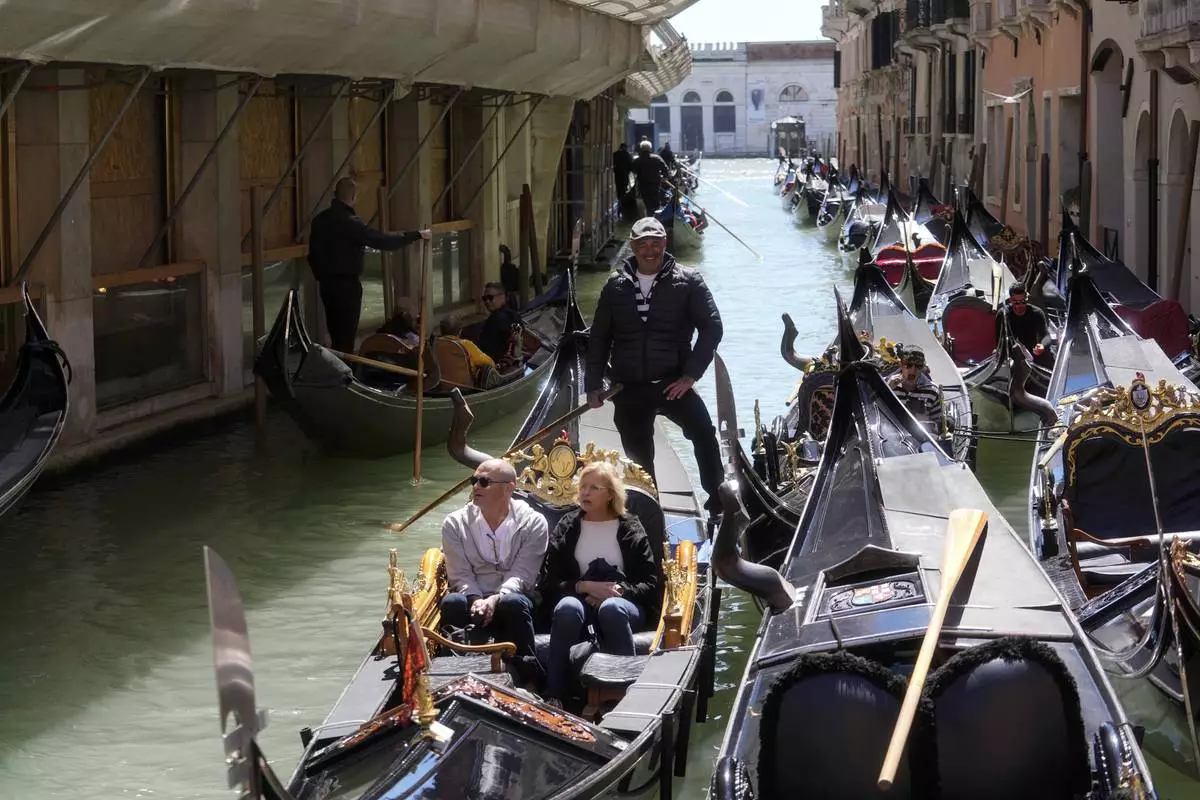
Tourists enjoy a ride on gondolas in Venice, Italy, Thursday, April 25, 2024. The fragile lagoon city of Venice begins a pilot program Thursday to charge daytrippers a 5 euro entry fee that authorities hope will discourage tourists from arriving on peak days. (AP Photo/Luca Bruno)
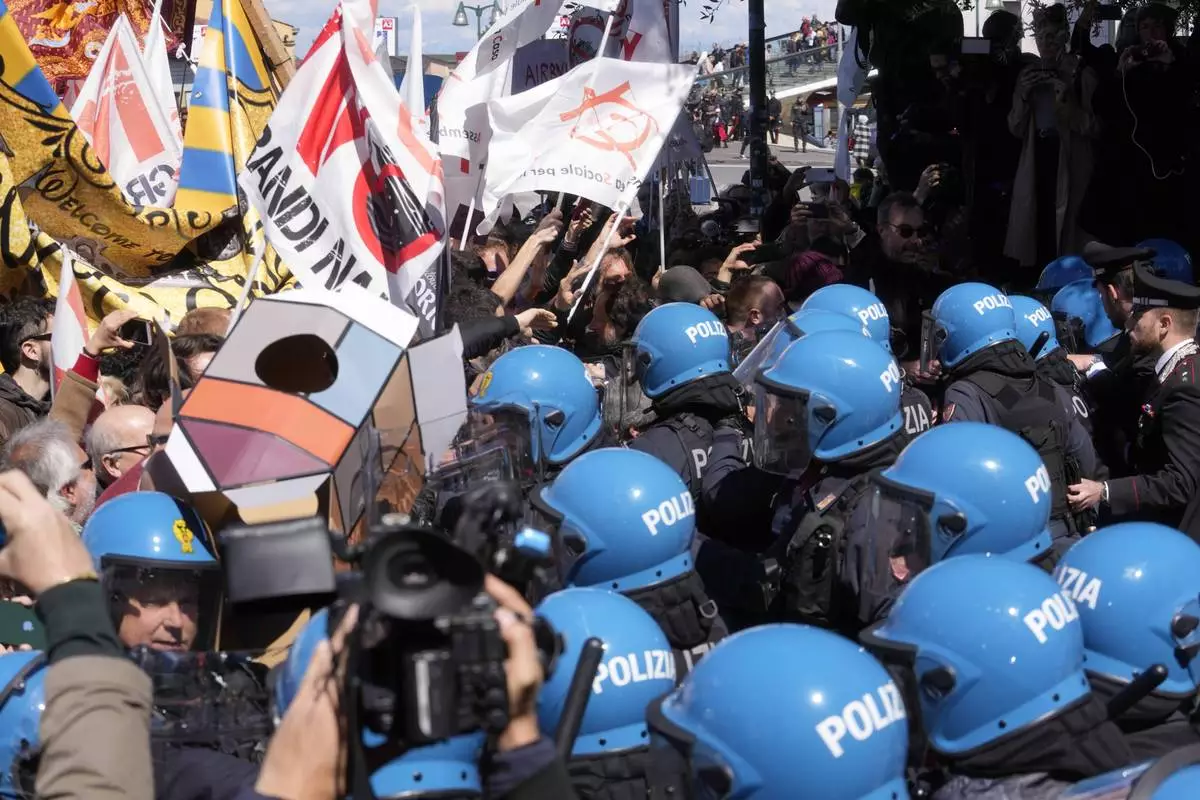
Citizens and activists confront police during a demonstration against Venice Tax Fee in Venice, Italy, Thursday, April 25, 2024. The fragile lagoon city of Venice begins a pilot program Thursday to charge daytrippers a 5 euro entry fee that authorities hope will discourage tourists from arriving on peak days. The daytripper tax is being tested on 29 days through July, mostly weekends and holidays starting with Italy's Liberation Day holiday Thursday. Officials expect some 10,000 people will pay the fee to access the city on the first day, downloading a QR code to prove their payment, while another 70,000 will receive exceptions, for example, because they work in Venice or live in the Veneto region. (AP Photo/Luca Bruno)
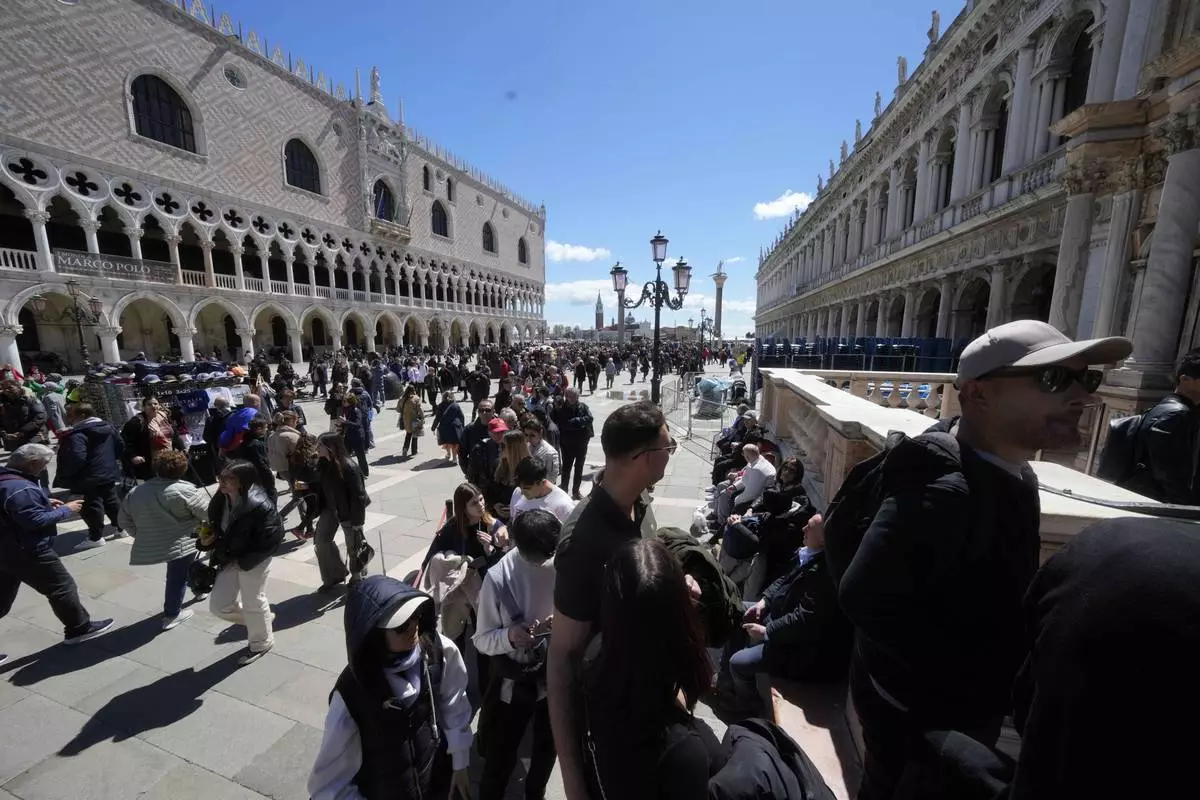
Tourists line up to enter at the at St.Mark bell tower in Venice, Italy, Thursday, April 25, 2024. The fragile lagoon city of Venice begins a pilot program Thursday to charge daytrippers a 5 euro entry fee that authorities hope will discourage tourists from arriving on peak days. (AP Photo/Luca Bruno)
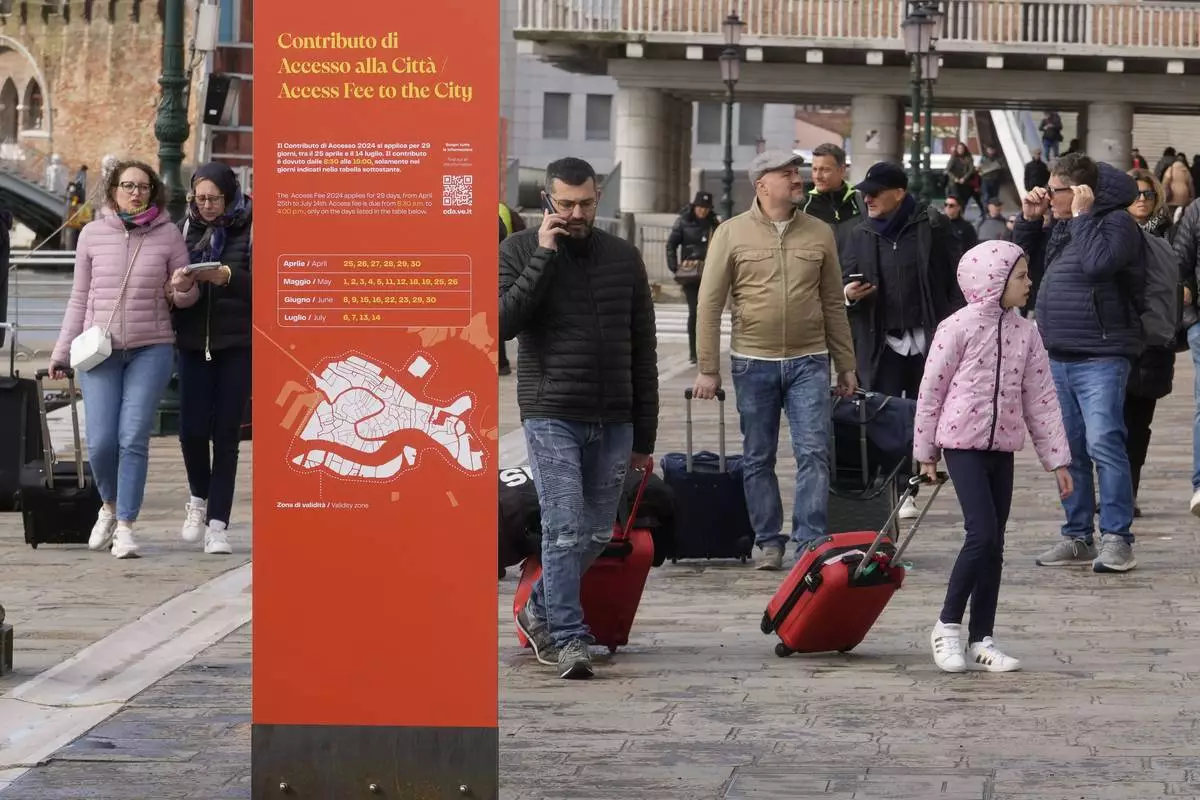
Tourists arrive in Venice, Italy, Thursday, April 25, 2024. The fragile lagoon city of Venice begins a pilot program Thursday to charge daytrippers a 5 euro entry fee that authorities hope will discourage tourists from arriving on peak days. The daytripper tax is being tested on 29 days through July, mostly weekends and holidays starting with Italy's Liberation Day holiday Thursday. Officials expect some 10,000 people will pay the fee to access the city on the first day, downloading a QR code to prove their payment, while another 70,000 will receive exceptions, for example, because they work in Venice or live in the Veneto region. (AP Photo/Luca Bruno)
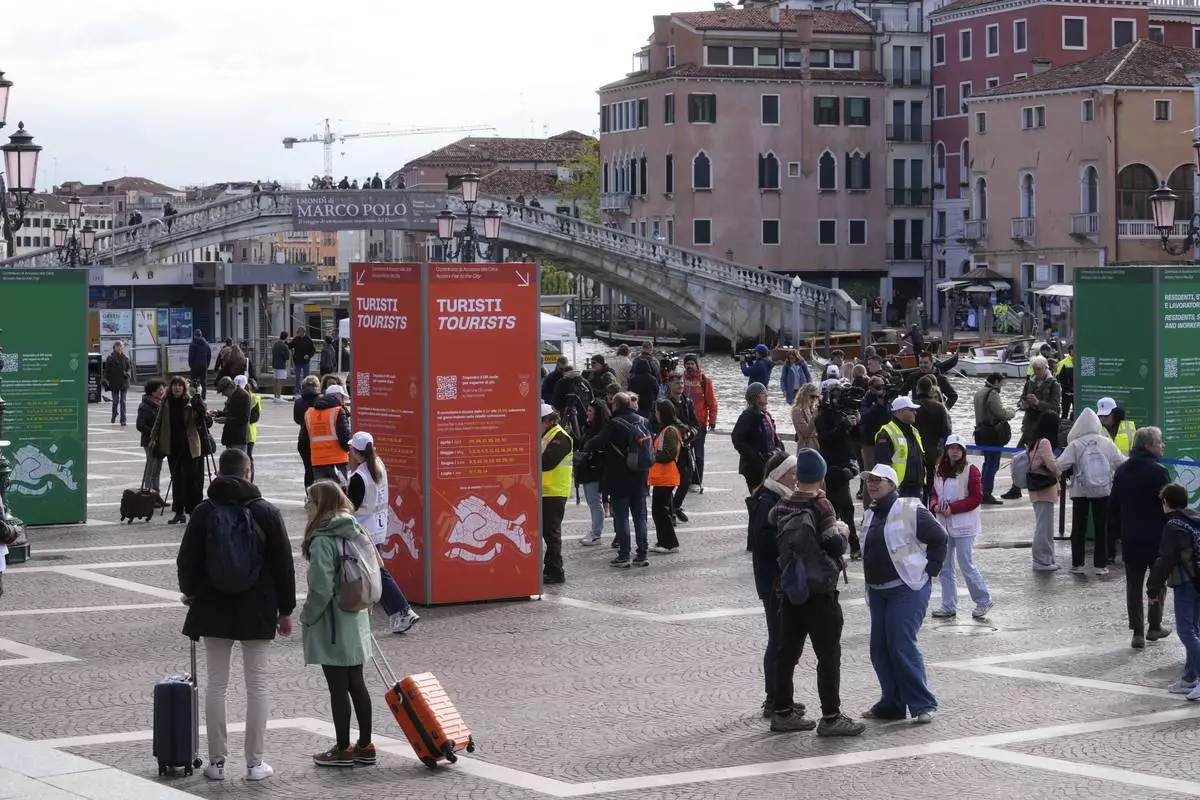
Stewards check tourists QR code access outside the main train station in Venice, Italy, Thursday, April 25, 2024. The fragile lagoon city of Venice begins a pilot program Thursday to charge daytrippers a 5 euro entry fee that authorities hope will discourage tourists from arriving on peak days. The daytripper tax is being tested on 29 days through July, mostly weekends and holidays starting with Italy's Liberation Day holiday Thursday. Officials expect some 10,000 people will pay the fee to access the city on the first day, downloading a QR code to prove their payment, while another 70,000 will receive exceptions, for example, because they work in Venice or live in the Veneto region. (AP Photo/Luca Bruno)
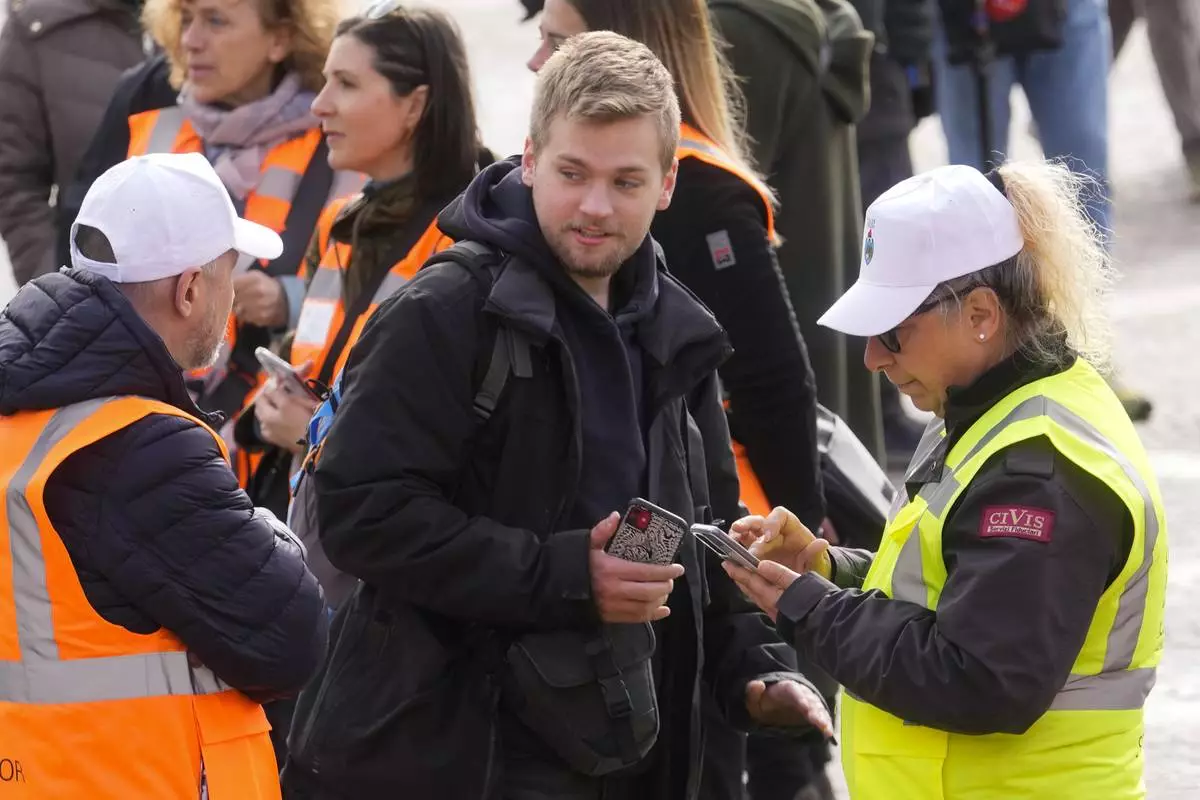
Stewards check a tourist QR code access outside the main train station in Venice, Italy, Thursday, April 25, 2024. The fragile lagoon city of Venice begins a pilot program Thursday to charge daytrippers a 5 euro entry fee that authorities hope will discourage tourists from arriving on peak days. The daytripper tax is being tested on 29 days through July, mostly weekends and holidays starting with Italy's Liberation Day holiday Thursday. Officials expect some 10,000 people will pay the fee to access the city on the first day, downloading a QR code to prove their payment, while another 70,000 will receive exceptions, for example, because they work in Venice or live in the Veneto region. (AP Photo/Luca Bruno)
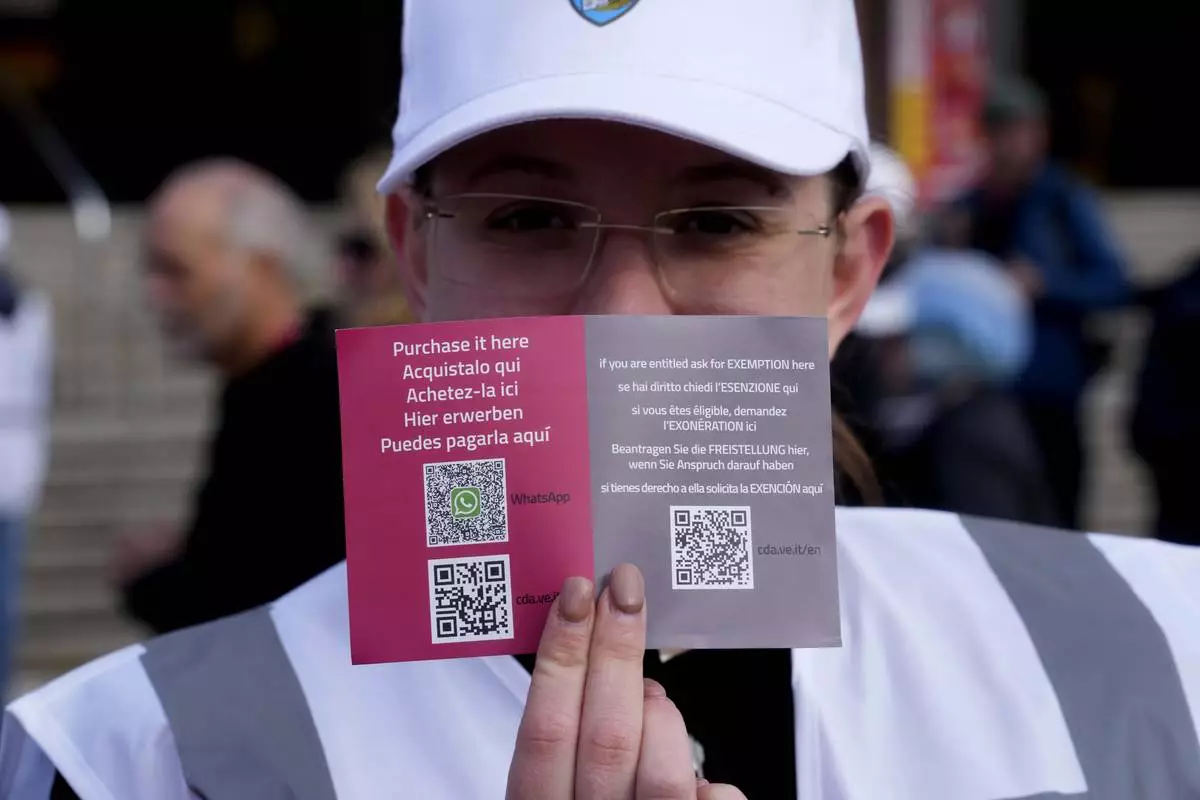
A steward shows the QR code access outside the main train station in Venice, Italy, Thursday, April 25, 2024. The fragile lagoon city of Venice begins a pilot program Thursday to charge daytrippers a 5 euro entry fee that authorities hope will discourage tourists from arriving on peak days. The daytripper tax is being tested on 29 days through July, mostly weekends and holidays starting with Italy's Liberation Day holiday Thursday. Officials expect some 10,000 people will pay the fee to access the city on the first day, downloading a QR code to prove their payment, while another 70,000 will receive exceptions, for example, because they work in Venice or live in the Veneto region. (AP Photo/Luca Bruno)
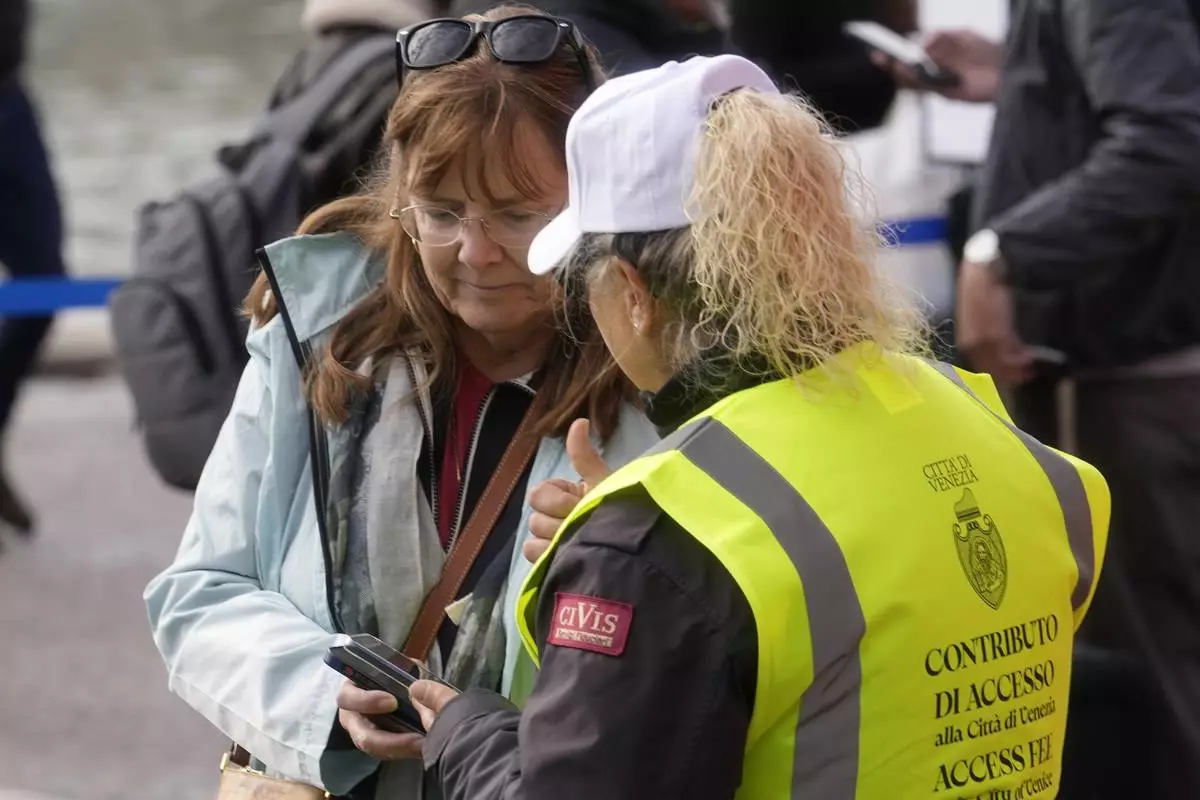
A steward checks a tourist QR code access outside the main train station in Venice, Italy, Thursday, April 25, 2024. The fragile lagoon city of Venice begins a pilot program Thursday to charge daytrippers a 5 euro entry fee that authorities hope will discourage tourists from arriving on peak days. The daytripper tax is being tested on 29 days through July, mostly weekends and holidays starting with Italy's Liberation Day holiday Thursday. Officials expect some 10,000 people will pay the fee to access the city on the first day, downloading a QR code to prove their payment, while another 70,000 will receive exceptions, for example, because they work in Venice or live in the Veneto region. (AP Photo/Luca Bruno)
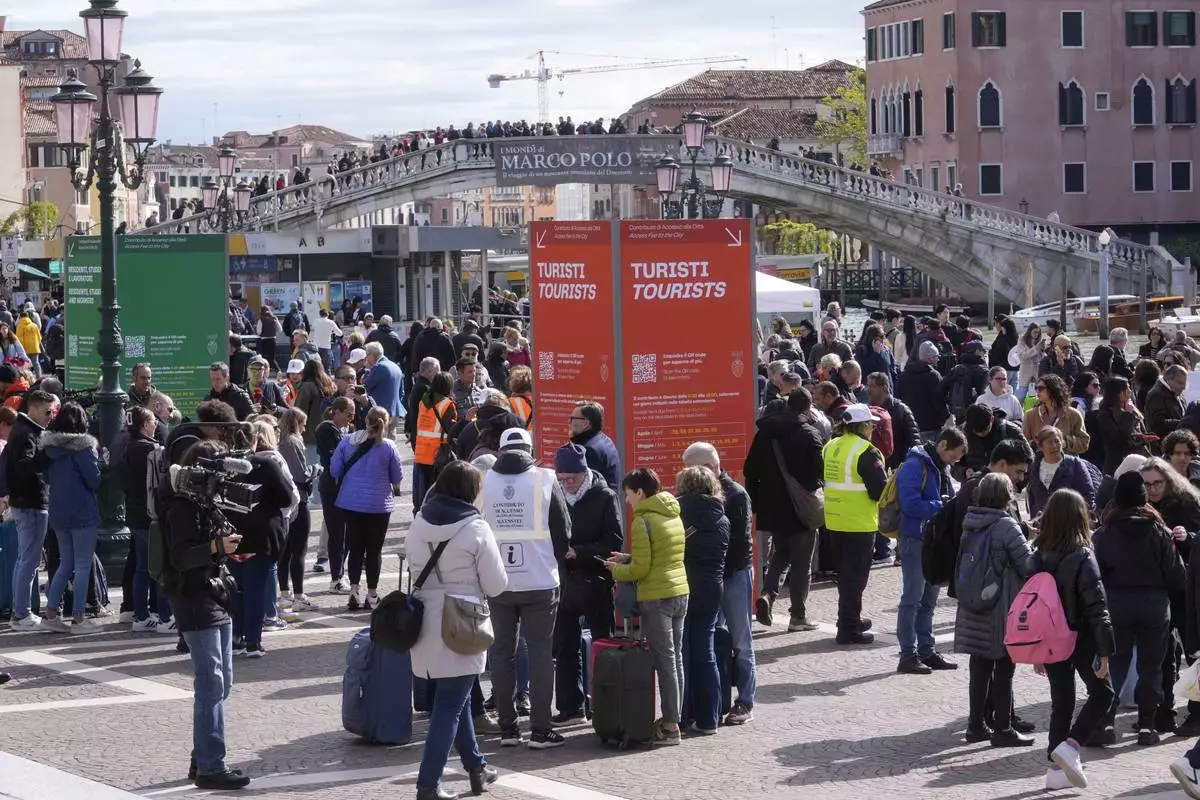
Stewards check tourists QR code access outside the main train station in Venice, Italy, Thursday, April 25, 2024. The fragile lagoon city of Venice begins a pilot program Thursday to charge daytrippers a 5 euro entry fee that authorities hope will discourage tourists from arriving on peak days. The daytripper tax is being tested on 29 days through July, mostly weekends and holidays starting with Italy's Liberation Day holiday Thursday. Officials expect some 10,000 people will pay the fee to access the city on the first day, downloading a QR code to prove their payment, while another 70,000 will receive exceptions, for example, because they work in Venice or live in the Veneto region. (AP Photo/Luca Bruno)
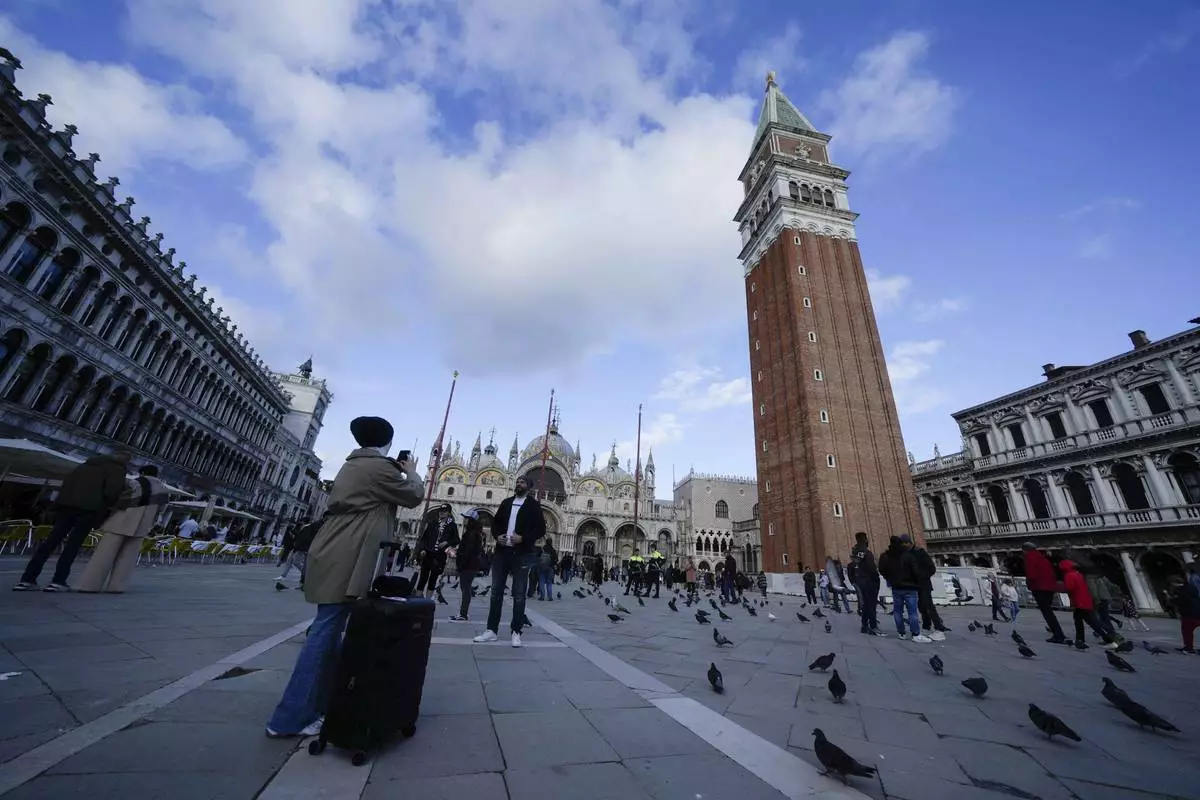
Tourists take pictures at the St. Mark square in Venice, Italy, Wednesday, April 24, 2024. The lagoon city of Venice begins a pilot program Thursday, April 25, 2024 to charge daytrippers a 5 euro entry fee that authorities hope will discourage tourists from arriving on peak days. Officials expect some 10,000 people will pay the fee to access the city on the first day, downloading a QR code to prove their payment. (AP Photo/Luca Bruno)
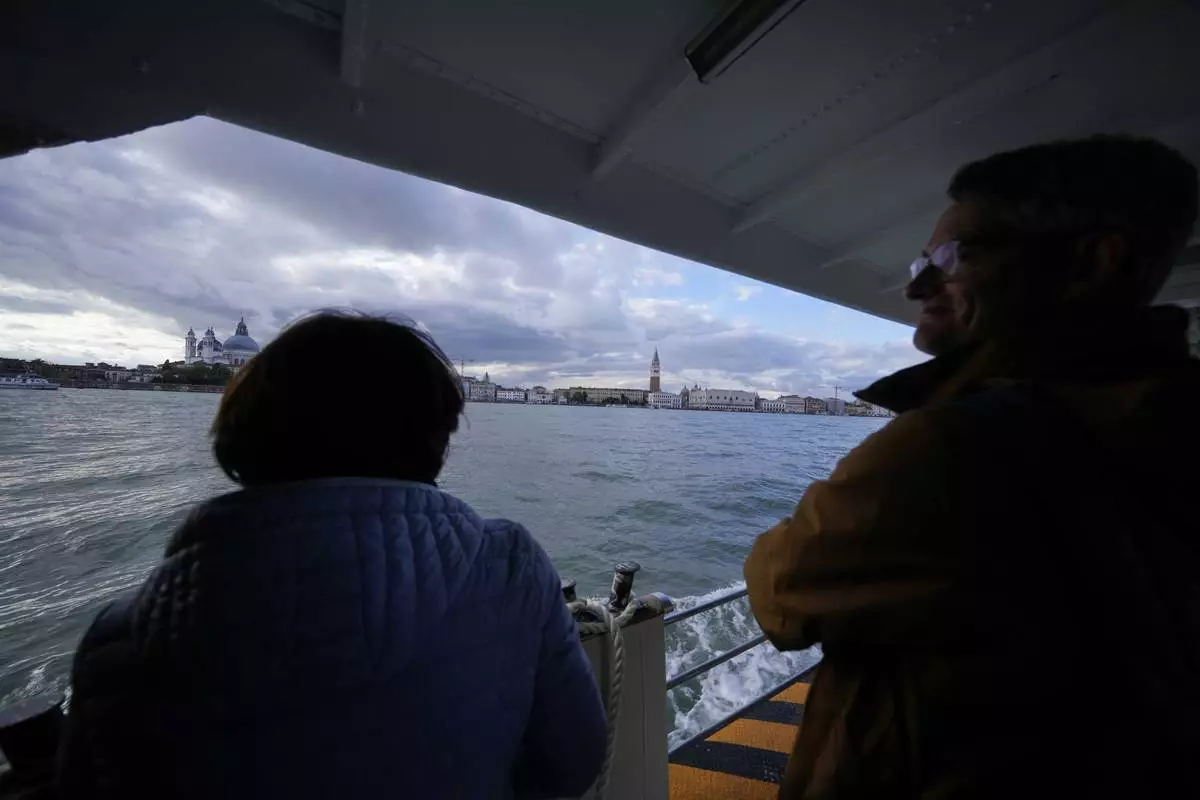
Tourists ride on a ferry boat in Venice, Italy, Wednesday, April 24, 2024. The lagoon city of Venice begins a pilot program Thursday, April 25, 2024 to charge daytrippers a 5 euro entry fee that authorities hope will discourage tourists from arriving on peak days. Officials expect some 10,000 people will pay the fee to access the city on the first day, downloading a QR code to prove their payment. (AP Photo/Luca Bruno)
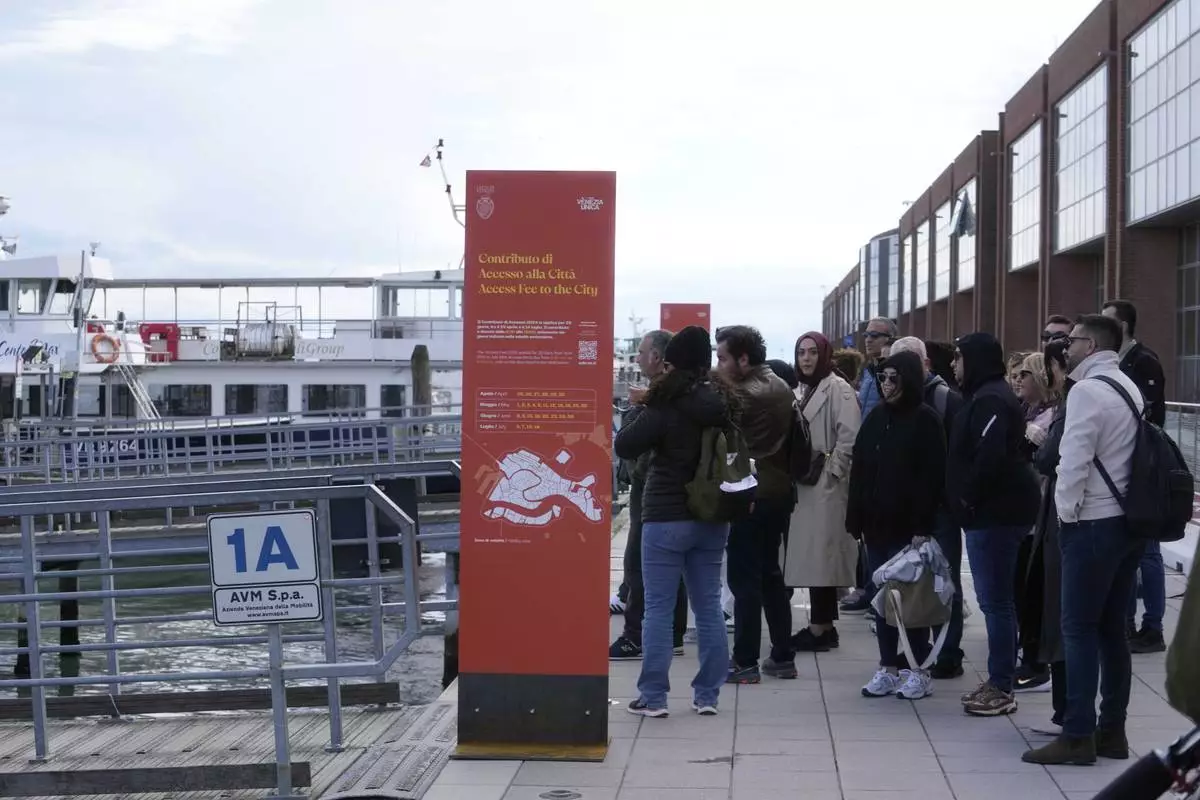
People stand in front of an information board explaining how to pay the tourist tax in Venice, Italy, Wednesday, April 24, 2024. The lagoon city of Venice begins a pilot program Thursday, April 25, 2024 to charge daytrippers a 5 euro entry fee that authorities hope will discourage tourists from arriving on peak days. Officials expect some 10,000 people will pay the fee to access the city on the first day, downloading a QR code to prove their payment. (AP Photo/Luca Bruno)
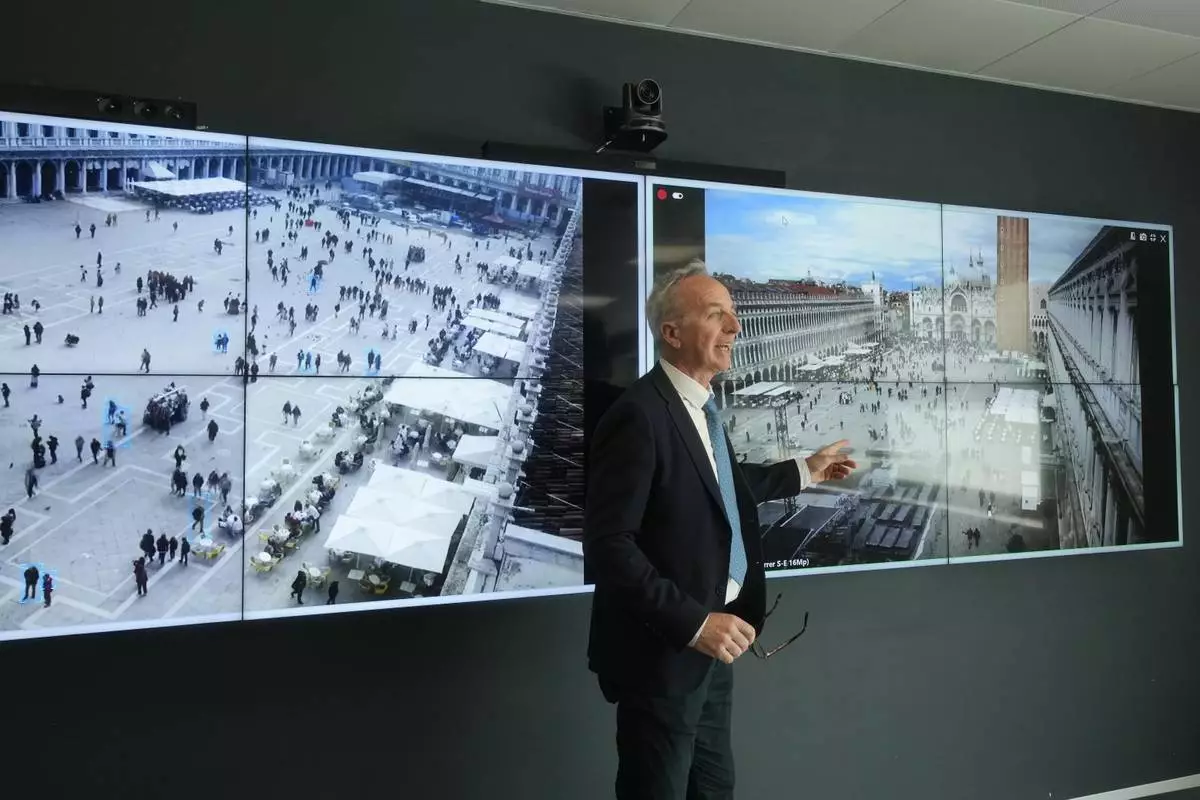
Marco Bettini, director of Venis Informatics System, gestures as he talks to reporters at the police Venice control room, in Venice, Italy, Wednesday, April 24, 2024. The lagoon city of Venice begins a pilot program Thursday, April 25, 2024 to charge daytrippers a 5 euro entry fee that authorities hope will discourage tourists from arriving on peak days. Officials expect some 10,000 people will pay the fee to access the city on the first day, downloading a QR code to prove their payment. (AP Photo/Luca Bruno)
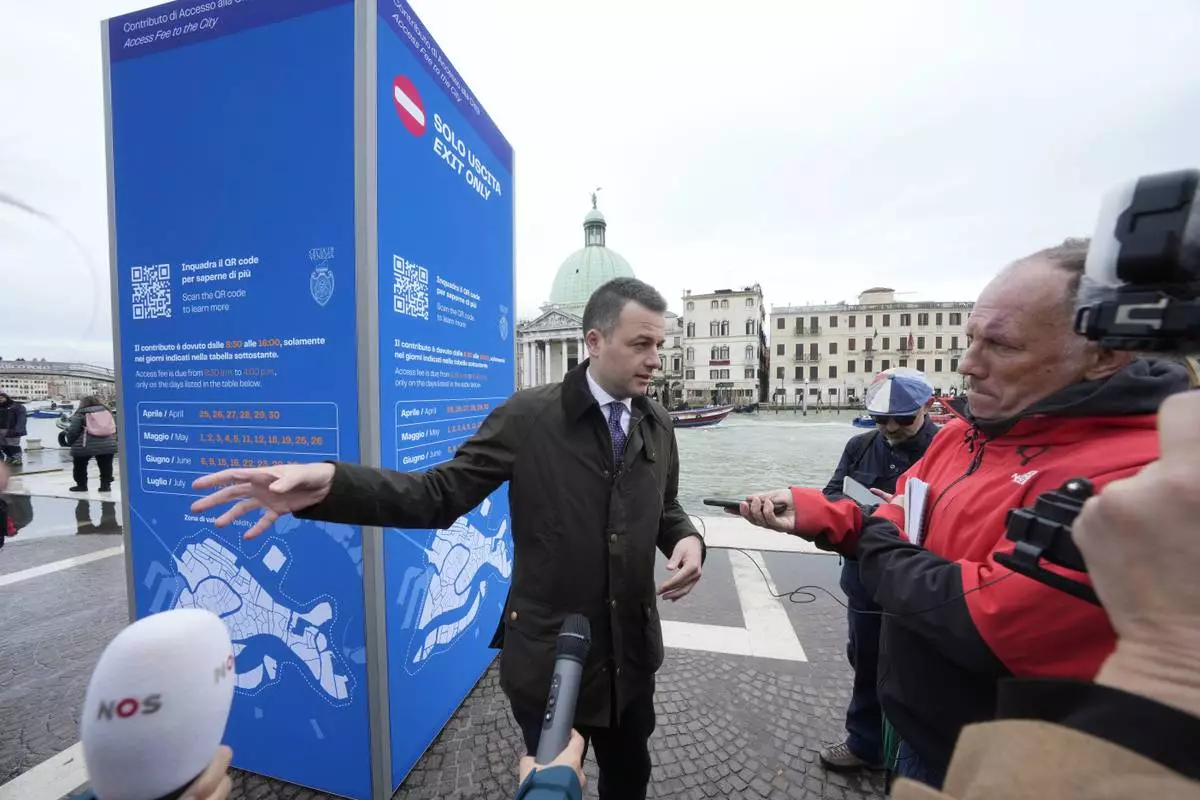
Venice councillor Simone Venturini speaks with reporters in front of a tourist tax totem in Venice, Italy, Wednesday, April 24, 2024. The lagoon city of Venice begins a pilot program Thursday, April 25, 2024 to charge daytrippers a 5 euro entry fee that authorities hope will discourage tourists from arriving on peak days. Officials expect some 10,000 people will pay the fee to access the city on the first day, downloading a QR code to prove their payment. (AP Photo/Luca Bruno)
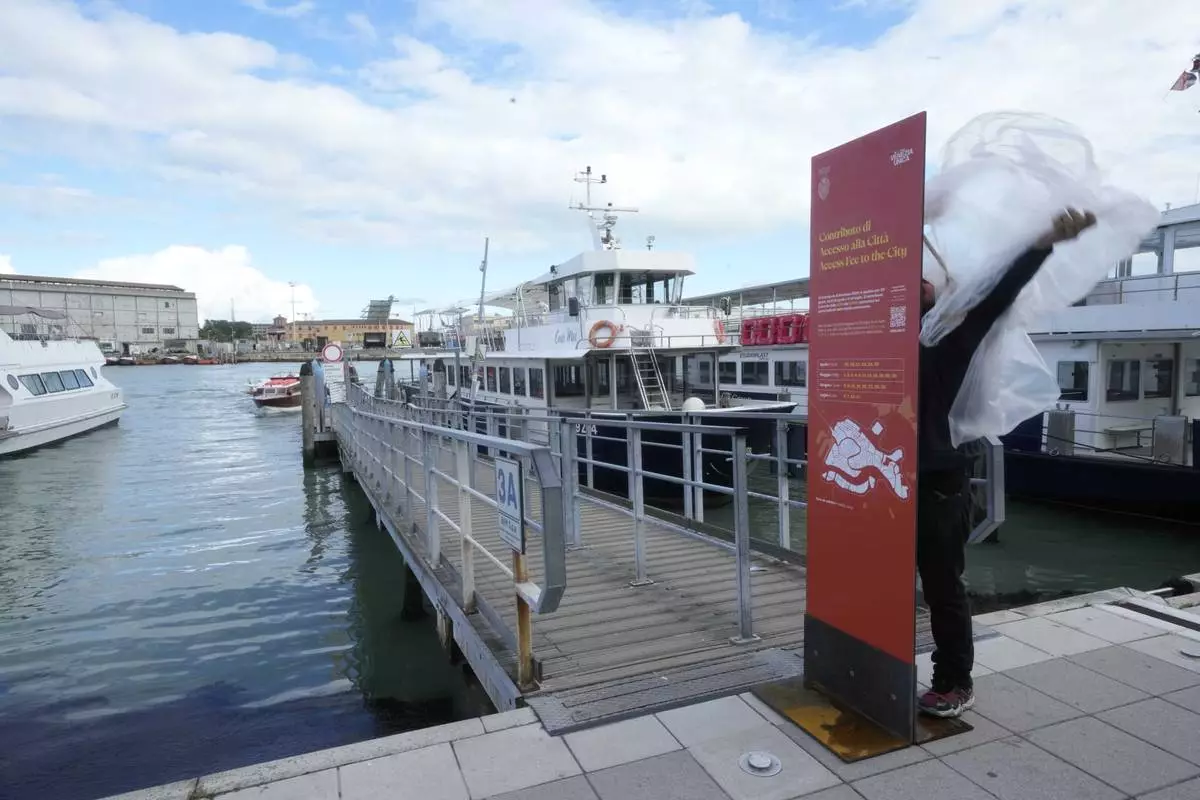
Workers prepare banner explaining how to pay the tourist tax in Venice, Italy, Wednesday, April 24, 2024. The lagoon city of Venice begins a pilot program Thursday, April 25, 2024 to charge daytrippers a 5 euro entry fee that authorities hope will discourage tourists from arriving on peak days. Officials expect some 10,000 people will pay the fee to access the city on the first day, downloading a QR code to prove their payment. (AP Photo/Luca Bruno)
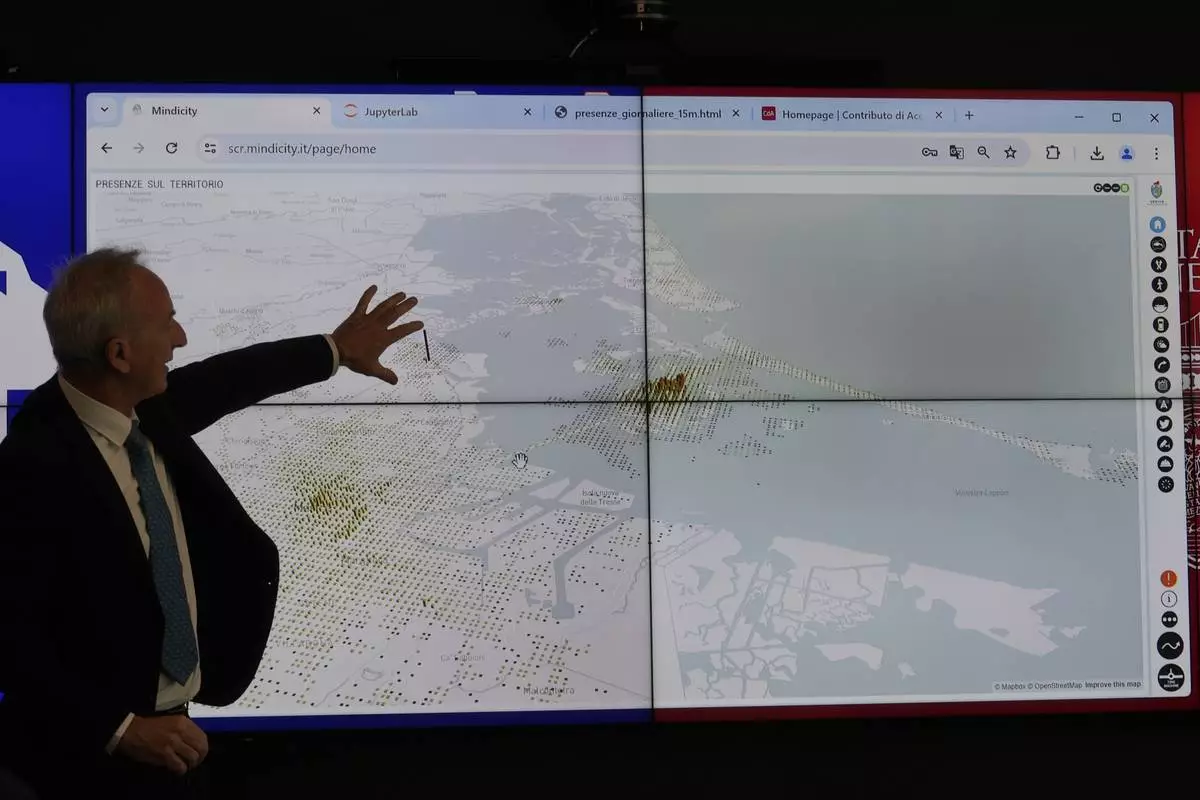
Marco Bettini, director of Venis Informatics System, gestures as he explains the Venice density to reporters at the police Venice control room in Venice, Italy, Wednesday, April 24, 2024. The lagoon city of Venice begins a pilot program Thursday, April 25, 2024 to charge daytrippers a 5 euro entry fee that authorities hope will discourage tourists from arriving on peak days. Officials expect some 10,000 people will pay the fee to access the city on the first day, downloading a QR code to prove their payment. (AP Photo/Luca Bruno)
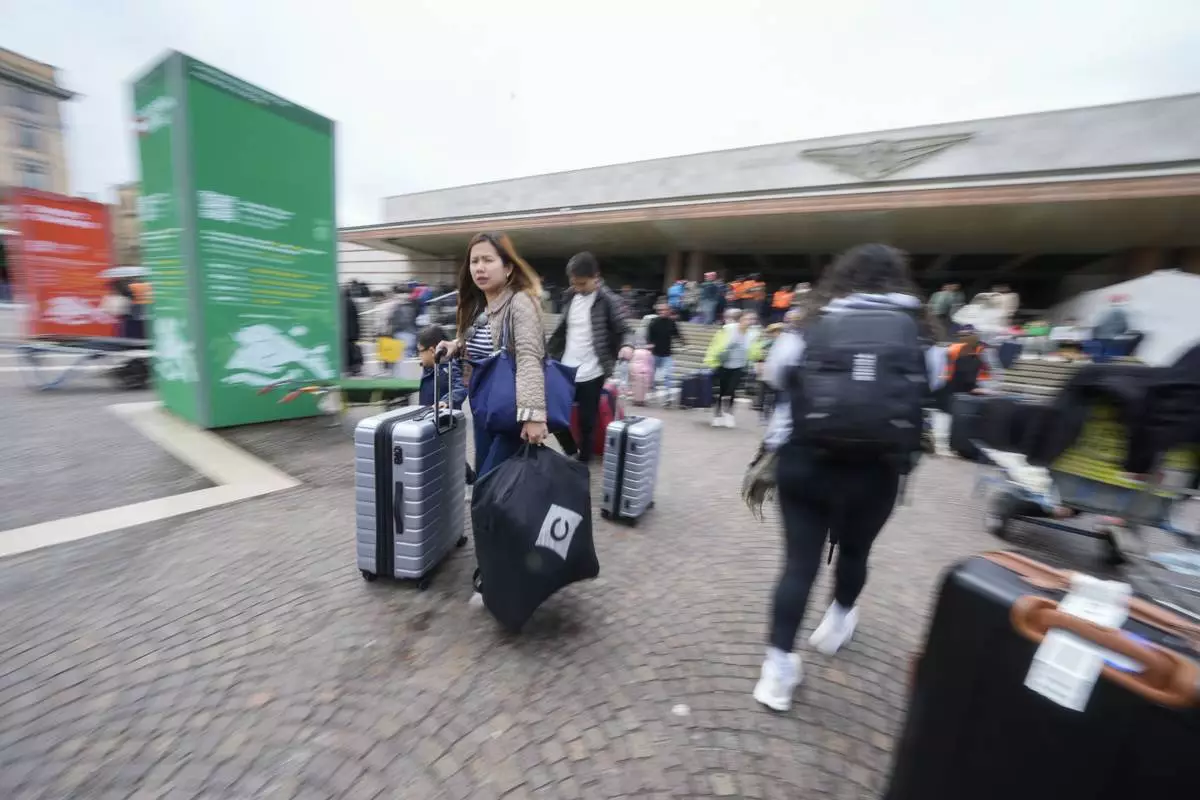
Tourists arrive at the main train station in Venice, Italy, Wednesday, April 24, 2024. The lagoon city of Venice begins a pilot program Thursday, April 25, 2024 to charge daytrippers a 5 euro entry fee that authorities hope will discourage tourists from arriving on peak days. Officials expect some 10,000 people will pay the fee to access the city on the first day, downloading a QR code to prove their payment. (AP Photo/Luca Bruno)
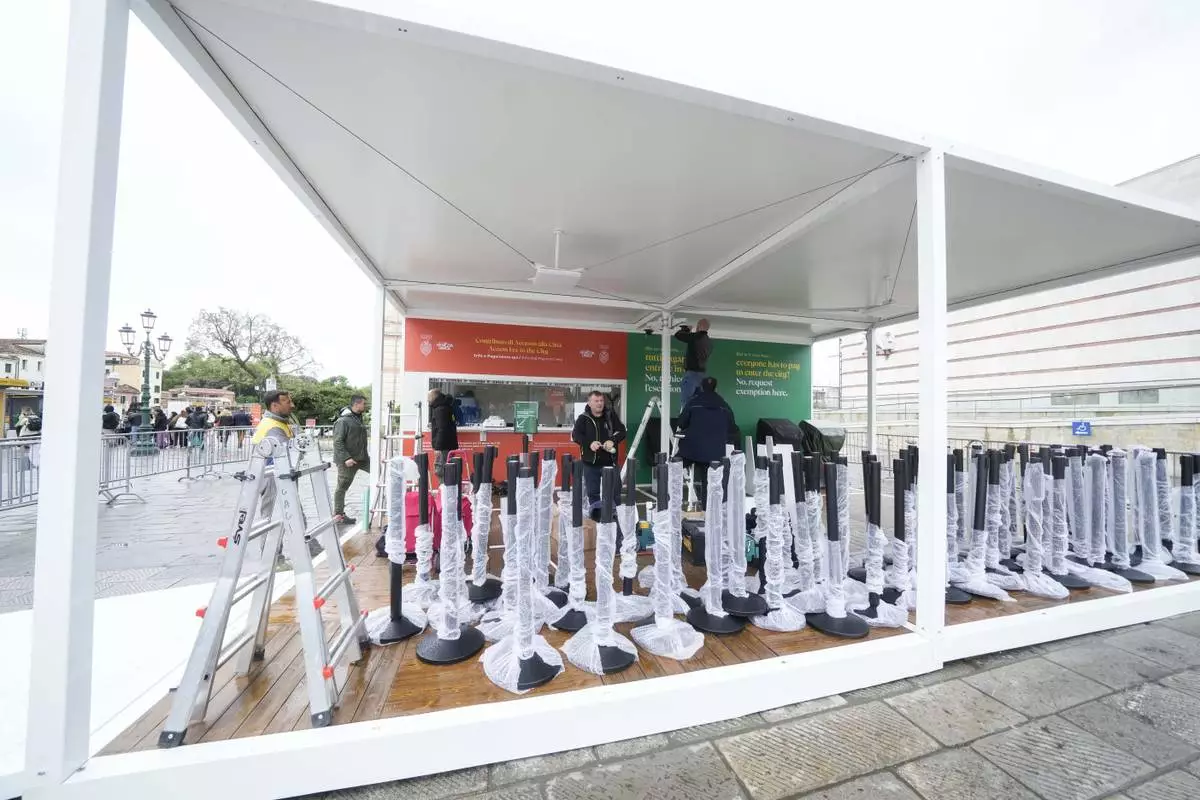
Workers prepare the tourist tax cashier desks outside the main train station in Venice, Italy, Wednesday, April 24, 2024. The lagoon city of Venice begins a pilot program Thursday, April 25, 2024 to charge daytrippers a 5 euro entry fee that authorities hope will discourage tourists from arriving on peak days. Officials expect some 10,000 people will pay the fee to access the city on the first day, downloading a QR code to prove their payment. (AP Photo/Luca Bruno)
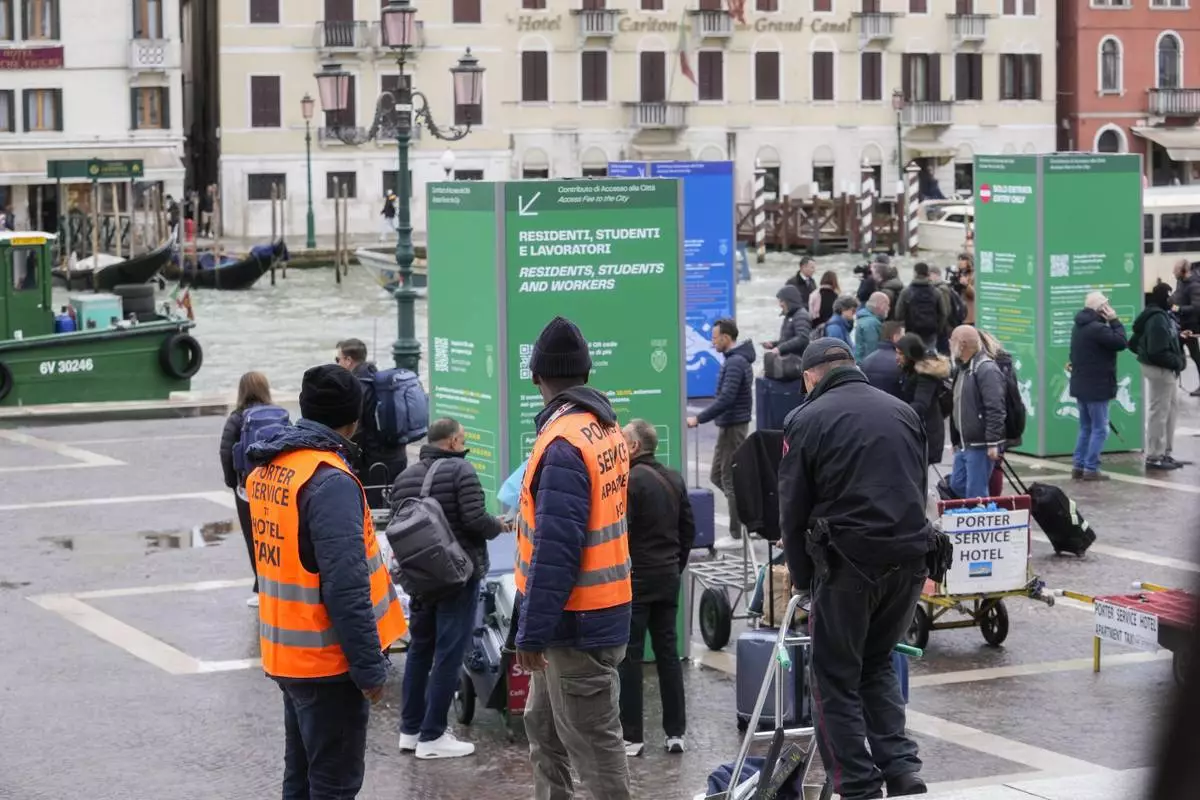
Porters wait for tourists outside the main train station in Venice, Italy, Wednesday, April 24, 2024. The lagoon city of Venice begins a pilot program Thursday, April 25, 2024 to charge daytrippers a 5 euro entry fee that authorities hope will discourage tourists from arriving on peak days. Officials expect some 10,000 people will pay the fee to access the city on the first day, downloading a QR code to prove their payment. (AP Photo/Luca Bruno)
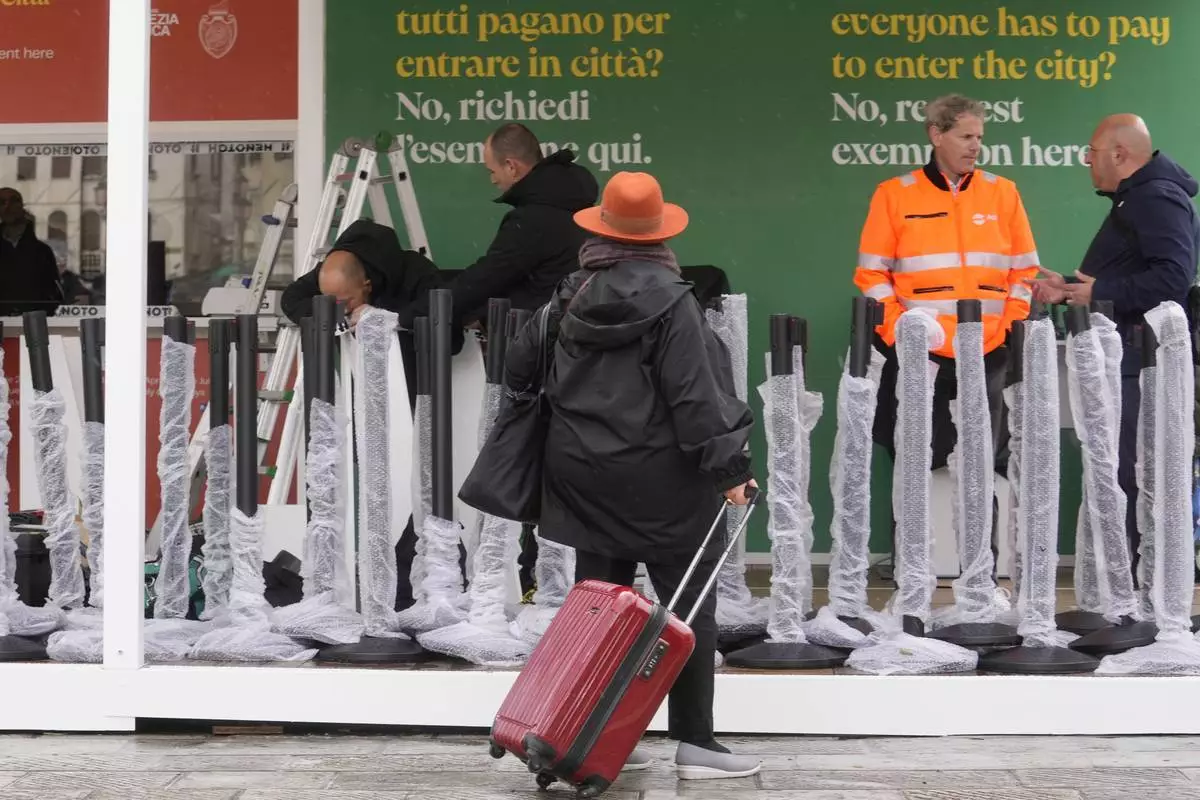
Workers prepare the tourist tax cashier desks outside the main train station in Venice, Italy, Wednesday, April 24, 2024. The lagoon city of Venice begins a pilot program Thursday, April 25, 2024 to charge daytrippers a 5 euro entry fee that authorities hope will discourage tourists from arriving on peak days. Officials expect some 10,000 people will pay the fee to access the city on the first day, downloading a QR code to prove their payment. (AP Photo/Luca Bruno)
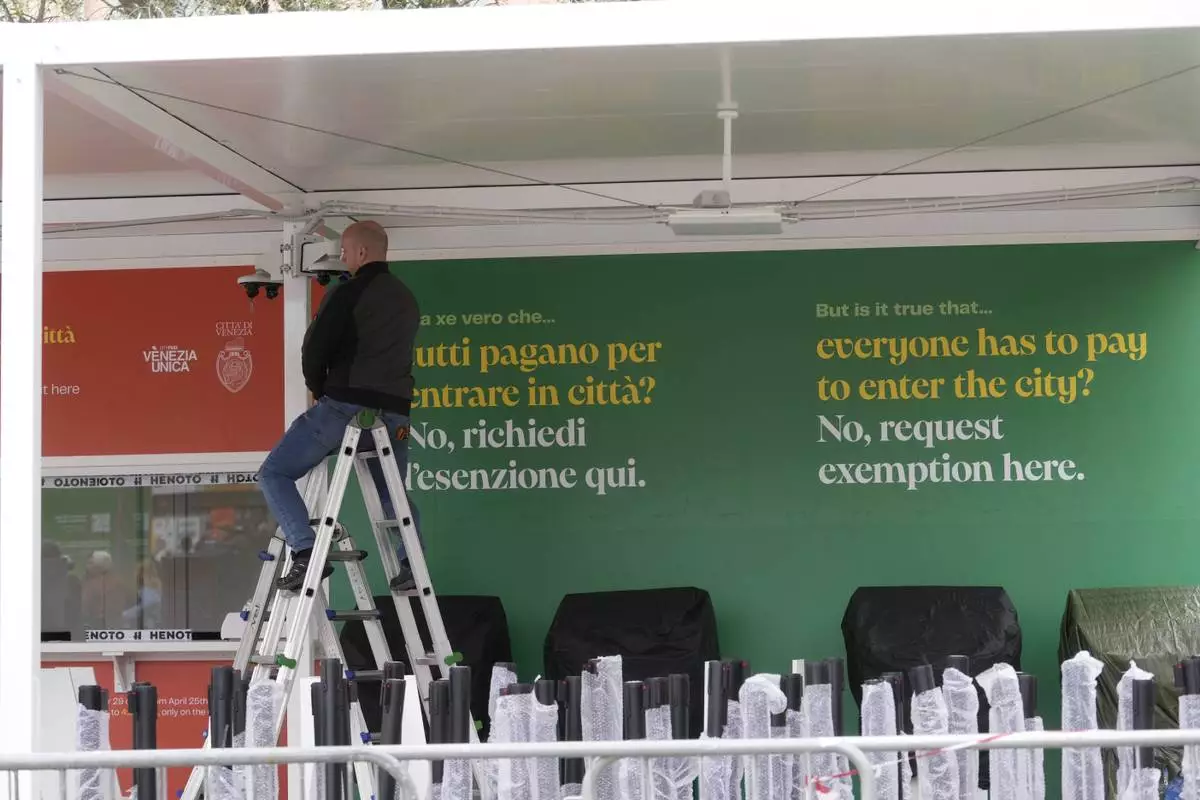
Workers prepare the tourist tax cashier desks outside the main train station in Venice, Italy, Wednesday, April 24, 2024. The lagoon city of Venice begins a pilot program Thursday, April 25, 2024 to charge daytrippers a 5 euro entry fee that authorities hope will discourage tourists from arriving on peak days. Officials expect some 10,000 people will pay the fee to access the city on the first day, downloading a QR code to prove their payment. (AP Photo/Luca Bruno)
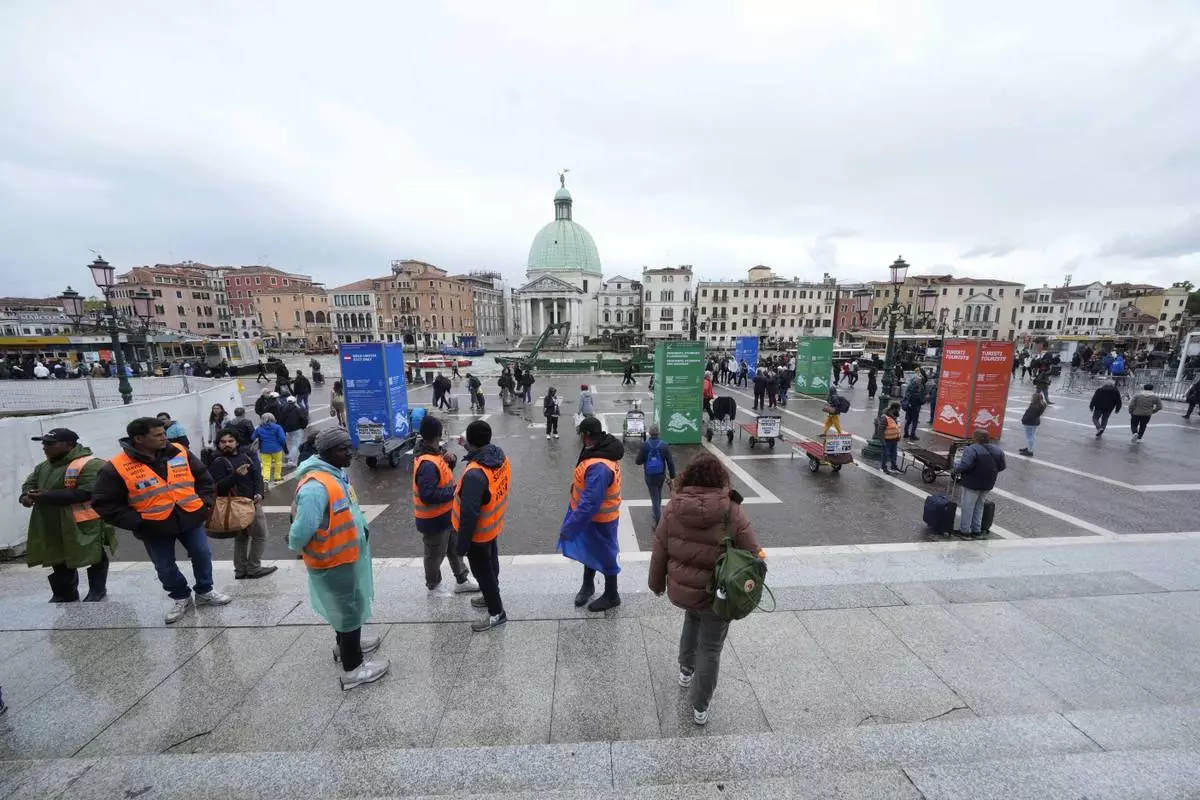
Porters wait for tourists outside the main train station in Venice, Italy, Wednesday, April 24, 2024. The lagoon city of Venice begins a pilot program Thursday, April 25, 2024 to charge daytrippers a 5 euro entry fee that authorities hope will discourage tourists from arriving on peak days. Officials expect some 10,000 people will pay the fee to access the city on the first day, downloading a QR code to prove their payment. (AP Photo/Luca Bruno)
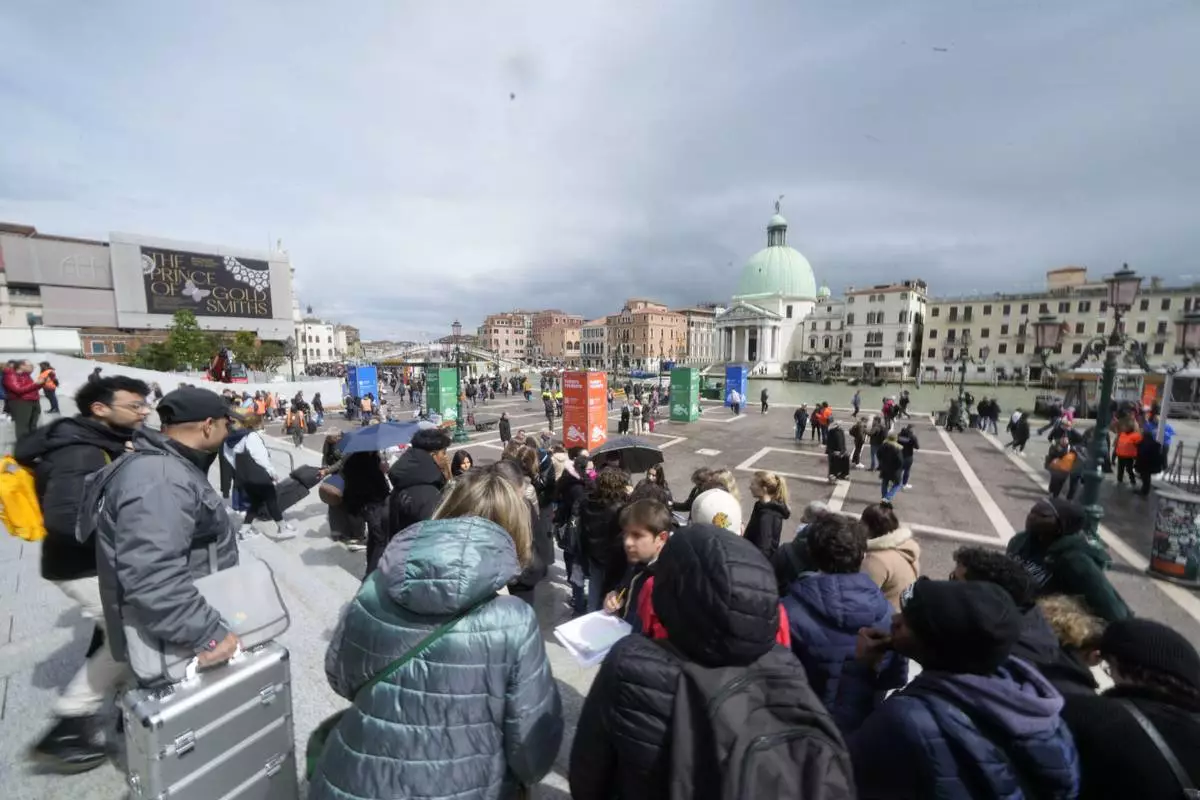
Tourists arrive outside the main train station in Venice, Italy, Wednesday, April 24, 2024. The lagoon city of Venice begins a pilot program Thursday, April 25, 2024 to charge daytrippers a 5 euro entry fee that authorities hope will discourage tourists from arriving on peak days. Officials expect some 10,000 people will pay the fee to access the city on the first day, downloading a QR code to prove their payment. (AP Photo/Luca Bruno)
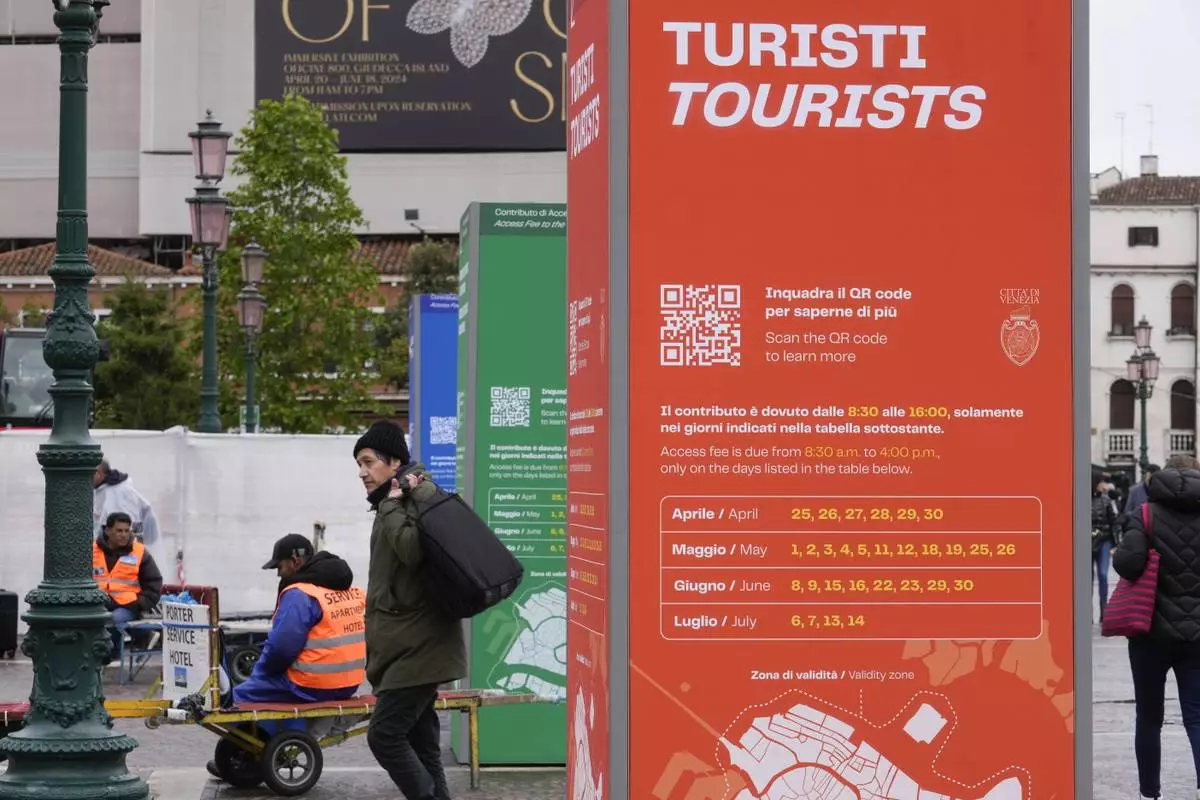
Tourist information boards are seen outside the main train station in Venice, Italy, Wednesday, April 24, 2024. The lagoon city of Venice begins a pilot program Thursday, April 25, 2024 to charge daytrippers a 5 euro entry fee that authorities hope will discourage tourists from arriving on peak days. Officials expect some 10,000 people will pay the fee to access the city on the first day, downloading a QR code to prove their payment. (AP Photo/Luca Bruno)
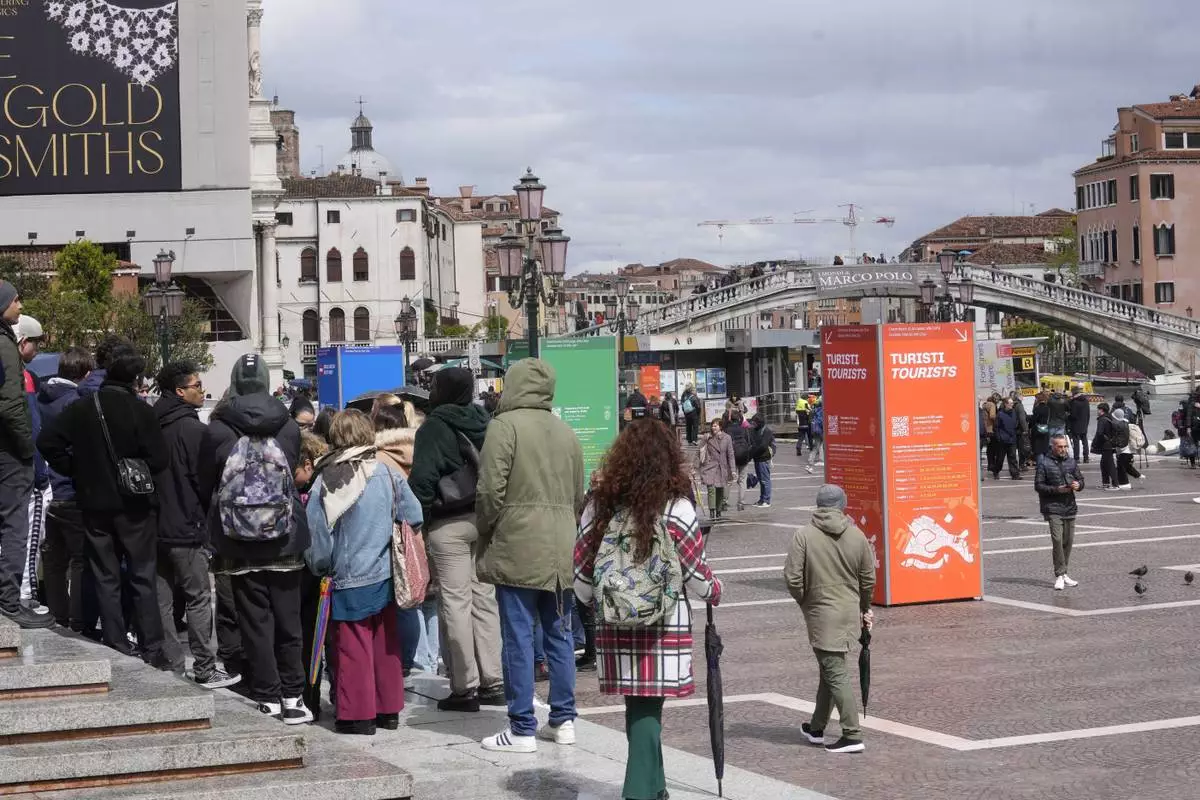
Tourists arrive outside the main train station in Venice, Italy, Wednesday, April 24, 2024. The lagoon city of Venice begins a pilot program Thursday, April 25, 2024 to charge daytrippers a 5 euro entry fee that authorities hope will discourage tourists from arriving on peak days. Officials expect some 10,000 people will pay the fee to access the city on the first day, downloading a QR code to prove their payment. (AP Photo/Luca Bruno)










































